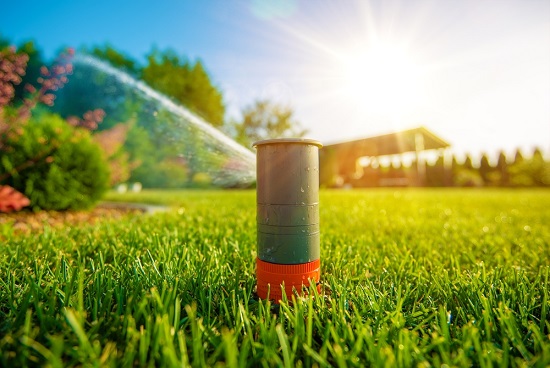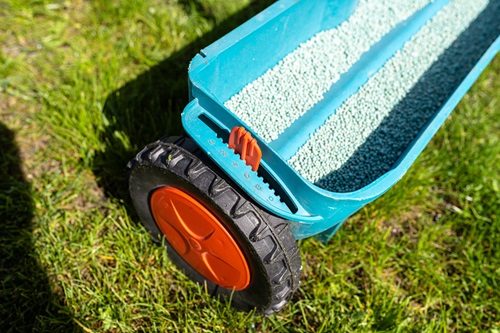
Spring lawn care is all about keeping your lawn green and healthy. Summer lawn care is all about keeping it healthy during high temperatures and frequent rainfall. It is also about keeping your lawn healthy and able to withstand the many activities that summer brings, such as running, playing, and eating out. These are some ways to keep your lawn looking great during the long, hot summer days.
Lawn Care Guide: Summer Lawns
Lawn grasses are subject to a lot of stress after the spring growth season. The heat and drought can be very damaging to lawn grasses. We are also not as patient in summer as we were in winter. Our lawns should be lush green and healthy for outdoor activities. We try to combat nature by fertilizing, watering, and encouraging new growth no matter the weather. You can care for your lawn gently by learning and understanding the seasonal changes in turf grasses.
Cool-season grasses like bluegrass, fescue and rye thrive if the temperature is in the 60s F.
Warmer season grasses, including Bermuda, St. Augustine and Centipede (all part of the warm-season grasses) love temperatures in the 70s.
Lawns will start to struggle when temperatures rise into the 80s. Cool-season grasses have the most difficulty. As they are less capable of recovering from traffic stress and growth, lawns may experience a slowing in growth and color fade. Cool-season lawns can even go dormant during the summer and become brown and brittle by early fall.
Water Properly
A lawn needs at least 1 inch of water each week. Lawns may need more if it is extremely hot. To keep track of how much water is being received from rain and irrigation, use a rain gauge.
To encourage drought-tolerant roots, water deeply and less often.
Water the lawn early in the morning to prevent evaporation and fungal growth.
You can either water your lawn frequently and deeply or you don’t need to water it at all. Do not let your lawn become brown or dormant. Instead, “water it back into life.” Your lawn should remain dormant from summer to fall. Don’t worry, it will recover when the weather turns.
Mowing tips
In the summer, there’s one mowing tip you should remember. Raise your mower blade. Higher grass is more resilient to drought, has deeper roots and shades the earth, which helps prevent weed seeds from germinating. Cool-season grasses should mowed at 3-4 inches in the summer or as high as you can get your blade to go. Warm-season grasses should mowed at 2-3 inches.
Mulching grass clippings keeps moisture levels stable.
Keep your grass cut to 1/3 of its original length. This will keep your grass healthy and prevent the clippings smothering it.
Keep mower blades sharp. To reduce stress in hot weather, make sure that your mower cuts your grass and not tears it.
Don’t Over Fertilize
Avoid fertilizing your lawn if it is looking unruly in the middle of summer. It’s better to stop fertilizing 30 days before the summer heat hits your area. Extra fertilizer applied in summer heat can cause lawn to become brittle and burn. Do not fertilize lawns that are still dormant. Wait until the autumn to fertilize them.
High-Traffic Areas
Many lawns start to show signs of wear by the end of summer, particularly along some popular paths. To minimize grass damage, consider installing stepping stones. Also, try to limit traffic to brittle or dormant lawns. To help your lawn recover quicker, apply some fertilizer to areas that are receiving a lot of rain and active growth.
Control Weeds
This is the best time for an important routine for lawn care in Myrtle Beach. Remove weeds that are growing and spread seed for next year. The targeted post-emergent herbicides can be used to kill broadleaf grass weeds but must be used when temperatures are below 85° F for a few more days. Remember that any product can cause damage to lawn grasses in the summer heat.
Insects & Diseases
Insect infestations can occur in summer lawns that are not being used or are under drought stress. While minor infestations can be treated easily, more serious problems will require treatment from pest control experts.
Fungal diseases such as brown patches and powdery mildew can also be a problem in summer. To keep nighttime moisture to a minimum, apply fungicide as needed.
Over the summer, grubs will start to hatch on your lawn. You can apply grub control to your lawn if grubs are a problem.
Call Conner’s Lawn Care Service now if you need help in taking care of your lawn.
Conner’s Lawn Care Service
Myrtle Beach, SC
843-504-4901
http://connerslawncare.com/

